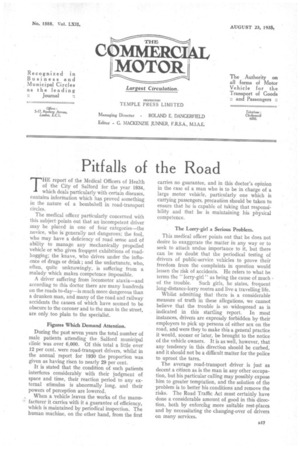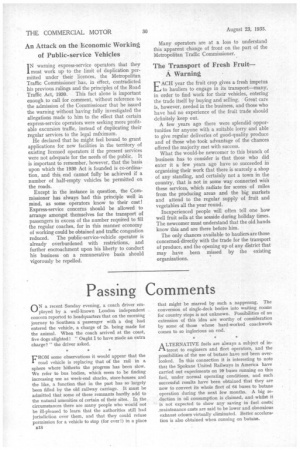Pitfalls of the Road
Page 27

Page 28

If you've noticed an error in this article please click here to report it so we can fix it.
THE report of the Medical Officers of Health of the City of Salford for the year 1934, which deals particularly with certain diseases, contains information which has proved something in the nature of a bombshell in road-transport circles.
The medical officer particularly concerned with this subject points out that an incompetent driver may be placed in one of four categories—the novice, who is generally not dangerous; the fool, who may have a deficiency of road sense and of ability to manage any mechanically propelled vehicle or who gives freqgent exhibitions of roadhogging; the knave, who drives under the influence of drugs or drink ; and the unfortunate, who, often, quite unknowingly, is suffering from a malady which makes competence impossible.
A driver suffering from locomotor ataxia—and according to this doctor there are many hundreds on the roads to-day---is much more dangerous than a drunken man, and many of the road and railway accidents the causes of which have seemed to be obscure to the coroner and to the man in the street, are only too plain to the specialist.
Figures Which Demand Attention.
During the past seven years the total number of male patients attending the Salford municipal clinic was over 6,000. Of this total a little over 12 per cent. were road-transport drivers, whilst in the annual report for 1930 the proportion was given as having risen to nearly 29 per cent.
It is stated that the condition of such patients interferes considerably with their judgment of space and time, their reaction period to any external stimulus is abnormally long, and their powers of perception are lowered.
When a vehicle leaves the works of the manufa.ctUrer it carries with it a guarantee of efficiency, which is maintained by periodical inspection. The human machine, on the other hand, from the first carries no guarantee, and in this doctor's opinion in the case of a man who is to be in charge of a large motor vehicle, particularly one which is carrying passengers, precaution should be taken to ensure that he is capable of taking that responsibility and that he is maintaining his physical competence.
The Lorry-girl a Serious Problem.
This medical officer points out that he does not desire to exaggerate the matter in any way or to seek to attach undue importance to it, but there can be no doubt that the periodical testing of drivers of public-service vehicles to prove their freedom from the complaints in question would lessen the risk of accidents. He refers to what he terms the " lorry-girl " as being the cause of much , of the trouble. Such girls, he states, frequent long-distance-lorry routes and live a travelling life.
Whilst admitting that there is a considerable measure of truth in these allegations, we cannot believe that the trouble is so widespread as is indicated in this startling report. In most instances, drivers are expressly forbidden by their employers to pick up persons of either sex on the road, and were they to make this a general practice it would, sooner or later, be brought to the notice of the vehicle owners. It is as well, however, that any tendency in this direction should be curbed, and it should not be a difficult matter for the police to uproot the tares.
The average road-transport driver is just as decent a citizen as is the man in any other occupation, but his particular calling may possibly expose him to greater temptation, and the solution of the problem is to better his conditions and remove the risks. The Road Traffic Act must certainly have done a considerable amount of good in this direction, both by enforcing more suitable rest-places and by necessitating the changing-over of drivers on many services.
An Attack on the Economic Working of Public-service Vehicles
IN warning express-service operators that they must work up to the limit of duplication permitted under their licences, the Metropolitan Traffic Commissioner has, in effect, contradicted his previous rulings and the principles of the Road Traffic Act, 1930. This fact alone is important enough to call for comment, without reference to the admission of the Commissioner that he issued the warning without having fully investigated the allegations made to him to the effect that certain express-service operators were seeking more profitable excursion traffic, instead of duplicating their regular services to the legal mkrimum.
He declared that he might feel bound to grant applications for new facilities in the territory of existing licensed operators if the present services were not adequate for the needs of the public. It is important to remember, however, that the basis upon which the 1930 Act is founded is co-ordination, and this end cannot fully be achieved if a number of half-empty vehicles be permitted on the roads.
Except in the instance in question, the Commissioner has always had this principle well in mind, as some operators know to their cost! Express-service concerns should be allowed to arrange amongst themselves for the transport of passengers in excess of the number required to fill the regular coaches, for in this manner economy of working could be obtained and traffic congestion reduced. The public-service-vehicle operator is already overburdened with restrictions, and further encroachment upon his liberty to conduct his business on a remunerative basis should vigorously be repelled. Many operators are at a loss to understand this apparent change of front on the part of the Metropolitan Traffic Commissioner. , The Transport of Fresh Fruit— A Warning EACH year the fruit crop gives a fresh impetus to hauliers to engage in its transport—many, in order to find work for their vehicles, entering the trade itself by buying and selling. Great care is, however, needed in the business, and those who have had no experience of the fruit trade should definitely keep out.
A few years ago there were splendid opportunities for anyone with a suitable lorry and able to give regular deliveries of good-quality produce and of those who took advantage of the chances offered the majority met with success.
What the would-be newcomer to this branch of business has to consider is that those who did enter it a few years ago have so succeeded in organizing their work that there is scarcely a shop of any standing, and certainly not a town in the country, that is not in some way connected with these services, which radiate for scores of miles from the producing areas and the big markets and attend to the regular supply of fruit and vegetables all the year round.
Inexperienced people will often tell one how well fruit sells at the seaside during holiday times. The newcomer must understand that the old hands know this and are there before him.
The only chances available to hauliers are those concerned directly with the trade for the transport of produce, and the opening up of any district that may have been missed by the existing organizations.




















































































